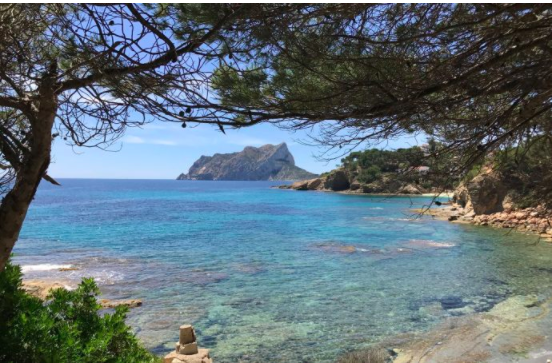Klara in Benissa
Benissa, former Convent des pares franciscans. Source: https://va.benissa.net/ver/1243/convent-dels-pares-franciscans.html?fbclid=IwAR3DFEQRoDxFOnVLrWzebBYlHRlolAbdyJilTRixY4hziJ4Mb2sae_PEx4E
Klara’s service in the Spanish Civil War is not all bombs and amputations. She does experience the rare window of satisfying work, friendship, the possibility of relaxation, and even the promise of love. One notable setting: the ancient Mediterranean town of Benissa, perched on the so-called “Costa Blanca,” and fragrant with briny sea-breezes, healing herbs, and tangy pines. Benissa’s former Franciscan convent was converted to a rehabilitation/leave center for volunteers of the International Brigades in March of 1937 and Klara is transferred there from Ocaña in June.
Historical figures with whom Klara interacts at Benissa include Egon Højland, one of the 550 Danish volunteers in the Brigades, himself recovering from injuries. These Danes, not unlike the American veterans of the Abraham Lincoln Brigade, were prosecuted by their government on their return home. Klara visits the office of Catalan-speaking José Baidal Roselló, president of the CNT and the valiant leader of attacks against local Civil Guard stations. She assumes the care of Lieutenant-Commissary Hermann Mayer, a German-Jewish volunteer who arrives at Benissa with a case of typhus, contracted at who-knows-which of the battles in which he distinguished himself (Madrid, Jarama, Guadalajara, Brunete). He recovers sufficiently well to become an administrator of the hospital and is replaced when the Benissa rehab center is officially designated as a hospital. The replacement is Dr. Leo Samet, age not quite 29, also Jewish, born in Boryslav, Poland and one of the over 5,000 Polish volunteers. I have looked into his genealogy, which you may see here and which includes an interesting description now located in Soviet-era archives, attempting to de-legitimize Samet’s political correctness. Klara resorts to what she is able to say in Yiddish to communicate with him.
Benissa, Dr. Hans Kaiser & Dora Haut Kaiser. Photo from https://lamarinaplaza.com/2017/10/19/el-recuerdo-de-dos-brigadistas-internacionales-en-benissa-ya-es-eterno/?fbclid=IwAR3LLFjpIe8amdyPdH0Z2LBWqJiYx8VBfXpZwl7QYuC3RO0RJnPuBEc5pOU
On a more personal level, Klara befriends a medical couple from Austria, Hans and Dora Haut Kaiser, whose baby is born at Benissa. In need of childcare so that she may continue to work as a nurse, Dora gathers donated furniture and creates a center to care for the children of Benissa, for children sent there as refugees from fascist attacks across the peninsula, and for her own child. You may see their genealogy here: And then there is the green-eyed Ernst Liefmann, a young tank-corps volunteer from Germany, who will be the subject of another blog and of more intimate times for Klara. A picturesque beach, Cala els Pinets, forms the backdrop for their first kiss.
Benissa, Cala els Pinets. Source: https://elmiralldelamarina.es/la-mejor-cala-de-benissa-para-perderse-pinets/
Klara is long gone from Benissa by the time of the forced and frantic evacuation of the hospital as the invasion of Franco’s fascists troops looms. She does return temporarily from Albacete, just long enough to recover from illness and, once recovered, to renew contact with Ernst.
The memory of Benissa is alive today, fostered in large part by one of its denizens, Robert Llopis i Sendra. In recognition of ten international volunteers buried in the Benissa cemetery, information suppressed by the Franco dictatorship, Robert spearheads annual commemoration ceremonies that are attended by people from all over the world. On November 4, 2017, a Benissa plaza was named in honor of Hans and Dora Haut Kaiser. Robert’s research has led to the publication of many articles and two important books, the most recent of which, Brigadistes, gathers completely new documentation, including what I have found about Klara. And in 2018, the local government, Generalitat, launched excavations of mass graves within Benissa of other wartime victims, including many Spaniards.
Benissa, commemorative tombstone of five IB volunteers. Photo from https://lamarinaplaza.com/2015/10/22/diez-anos-de-homenajes-a-las-brigadas-internaciones-en-benissa/?fbclid=IwAR0-o1PxMLLw62DwuXSfVdeGPLJeoTSNw8wBhJtF82vlxbk4FBZuqSITbUo
I have never been to Benissa, but I have been invited. May I stay well and see that day!



